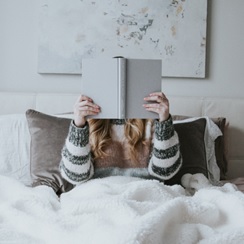
Our daily lives have become infiltrated with screens, from laptops to smartphones to tablets. We use our phones for an alarm clock in the morning, work at a computer during the day, and watch movies at night. The amount of screen time we consume has consequences, especially on our sleep!
The Digital Glow
The effects of spending so much time basking in the digital glow keep us from feeling rested when we wake up. We may be asleep, but we’re not getting the restful sleep we need. Before electricity, it was easier to pay attention to when the sun was setting and rising. The blue light radiating from our screens has moved us away from the ebb and flow of natural light.
Melatonin
Melatonin is released into our system hours before bedtime, telling us it’s time to think about sleep. Melatonin levels are low during the daytime and high in the darkness. Artificial light inhibits melatonin production. We feel alert even when we’re tired, so it becomes harder to fall asleep and stay asleep.
Digital Detox
A little digital detox can improve our well-being. Sure, blue light glasses and software on your computer or phone can help, but unplugging is going to help the most. A few hours before bedtime, power down. Lower the lights. Read a paper book in bed, do some low-impact stretching, or play some soft music. You’ll reduce the number of stimuli reaching your brain, allowing you to relax, and let go, easing your body and mind into slumber. You’ll sleep deeply and wake up rested.
